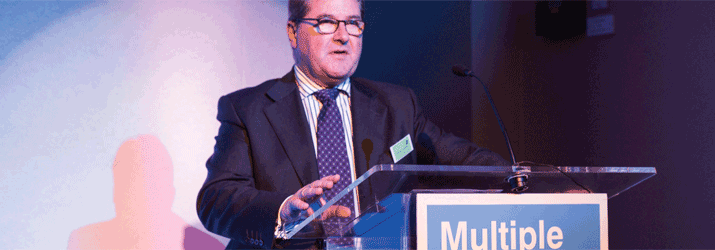
In early June, the MS Trust co-hosted the 2014 RIMS (Rehabilitation in MS) Conference alongside University College London Hospitals Foundation Trust. This is the first time RIMS has been held in the UK and the theme of the conference was “Supporting behaviour change, linking science to clinical practice.”
The conference gave the 326 delegates from Europe and beyond the opportunity to learn, share best practice, network, and hear key clinical and opinion leaders in the field of MS. As well as originating from 26 different countries, the delegates represented a wide variety of professions including MS nurses, physiotherapists, occupational therapists, GPs, psychologists, social workers and speech and language therapists.
Factors influencing behaviour change
The conference opened with Jared Bruce, University of Missouri, USA. He discussed the poor adherence rates to MS treatment, with 40-50% of patients failing to adhere after two years. He looked at some of the cognitive, emotional, lifestyle and medical issues that can contribute to this including anxiety and depression. He went on to explore avenues for improving adherence to both medical and behavioural rehabilitation interventions.
The patient’s perspective: what is behavioural change about and how does it manifest in ‘real life’?
In a first for RIMS, two people with MS were invited to give their perspective on the reality of being given a diagnosis of MS, the challenges it brings to everyday life, and how they negotiate the upsets to restore and empower their lives. This session was extremely well received by the audience. Shana Pezaro, Trustee, the Federation Centre for Independent Living, discussed how different forms of exercise including squats and half-marathons have helped her manage her current health. She described how it had both helped her lose weight and transformed her confidence, to the extent that she started dating again. Emma Rogan, Project Coordinator, European MS Platform chose to speak about how taking care of your mental wellbeing was equally important to help you build resilience for the years ahead.
RIMS Honorary Lecture
The RIMS honorary lecture was provided by Professor Alan Thompson, Dean, UCL Faculty of Brain Sciences, University College London. He described the formation of the Progressive MS Alliance to address the needs of people with progressive MS, who constitute over 50% of the MS population. Management of progressive MS currently focuses on rehabilitation and symptom management as there is no effective treatment to slow or stop progression. However, there is a decided lack of studies focusing on this field, therefore the Progressive MS Alliance hopes to encourage innovative studies that will address both cognitive and motor dysfunction.
Although the ultimate goal is to find treatments that will delay and prevent progression, Professor Thompson argued that good quality rehabilitation and symptom management trials are also needed to improve the quality of life for those with progressive MS.
Other plenary sessions
Rona Moss-Morris, from King’s College, London, discussed a cognitive behavioural therapy (CBT) programme designed to assist people with MS adjust to their diagnosis, and a mindfulness programme developed for people with progressive MS. Klaus Pfeifer, University of Erlangen-Nurnberg, Germany, described the development of a “Behavioural Exercise Therapy” programme to promote physical activity in people with neurological conditions. Paul van Asch, from the National MS Center in Belgium, presented a review of the many international sporting events organised by “Move to Sport”. This is an organisation that aims to change people’s ideas about sport and MS, by providing education sessions for health professionals, and sport and fitness coaches for people with MS to enable them to participate in sports in their own environment.
Posters
Nearly 100 posters were displayed at conference on a wide variety of topics. Platform presentations included health management, the economic burden of MS, bladder and bowel function and exercise treatment. All other researchers who had posters accepted were given one minute to sum up their research findings in the “speed poster presentation” slots, which proved to be both lively and informative sessions.
Prizes
The prize for the best oral presentation went to Jon Marsden, UK for his talk on the “Effect of localized lower limb warming and cooling on neuromuscular impairments and functional ability.” The prize for the best poster presentation went to Paul Taylor, UK for his poster “A comparison of external and implanted FES for correction of dropped foot in MS.”
ACNR 2014;14(4):37. Published online 29/9/14